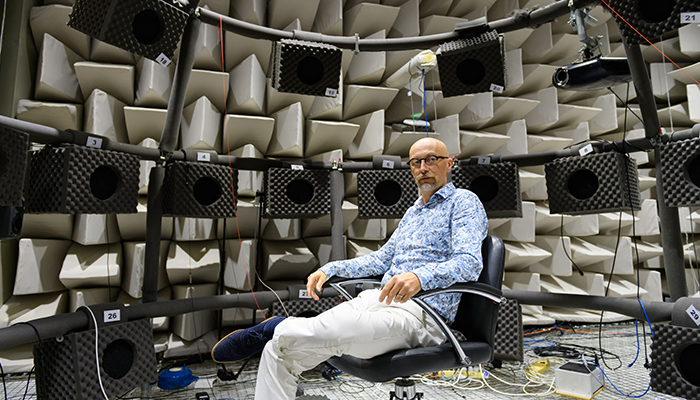Hearing loss may be an early warning sign of other serious health conditions, says Professor David McAlpine, Macquarie University’s Director of Hearing Research.

Triple threat: A person with moderate hearing loss faces three times the risk of being diagnosed with dementia.
“Hearing has been treated as a poor cousin to many other conditions,” says Professor McAlpine. “Most people seem to have accepted it as an inevitability to some degree that you get old and you just lose your hearing. What we are researching is that there might be an exacerbating effect of hearing loss on other conditions.”
McAlpine points to a significant correlation with dementia and hearing loss - an area of growing research interest for Macquarie as researchers across linguistics and cognitive science collaborate in this area.
Associate Professor Frank Lin at Johns Hopkins University in the US - who works closely with McAlpine and colleagues at Macquarie - led a study that tracked 636 people over 12 years and discovered that hearing loss was intricately linked to dementia.
If we deal with hearing loss ... of not being able to interact with others, then other problems might diminish.
If a participant had mild hearing loss, it doubled their risk of a dementia diagnosis, with moderate hearing loss they faced three times the risk and with severe hearing loss they faced five times the risk of developing dementia.
“The point is if we deal with the hearing loss, with the cognitive problem of not being able to hear, to communicate properly and interact with others, then the other problems might diminish,” McAlpine says.
In addition, a direct effect on your hearing could also lead to a cascade of other events.
“If you have reduced sensory input your brain could atrophy a bit and then you get into a pattern of behaviours that is not consistent with good health that leads to cognitive decline,” he says.

Sounding out research: Professor David McAlpine is Macquarie University’s Director of Hearing Research.
Lin from Johns Hopkins found in a study that people in their 50s with undiagnosed hearing loss had a cognitive decline nine years more than their age even if they had mild hearing loss.
Another comorbidity to hearing loss is diabetes; blood vessels in the inner ear can theoretically be damaged by too much sugar in the blood. A Taiwanese study of 26,556 newly-diagnosed diabetes patients found that they had a significantly increased risk of developing some degree of hearing loss.
Hearing is very sensitive to how much oxygen we have in our blood ... and things that are hurting your cardiovascular system are also affecting your hearing
Similarly, rheumatoid arthritis is associated with hearing loss and several studies have shown that people with the condition are much more likely than people without to develop hearing loss, particularly sensorineural hearing loss - a condition which occurs when there is damage or malfunction of hair cells in the cochlear.
- New cochlear study to help millions of Chinese children
- How loud does music have to be before it damages your hearing?
At the same time, people with cardiovascular disease have reduced blood flow and this can affect their hearing and lead to hearing loss. The inner ear has one blood vessel, which makes it more susceptible to fluctuations in blood pressure and cholesterol.
“Hearing is very sensitive to how much oxygen we have in our blood and blood flow and things that are hurting your cardiovascular system are also affecting your hearing,” McAlpine says. “The point is that if you don’t have a hearing test, you are not even trying to address the issue.”



